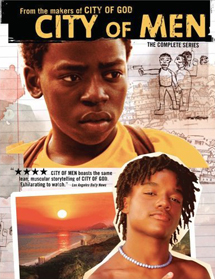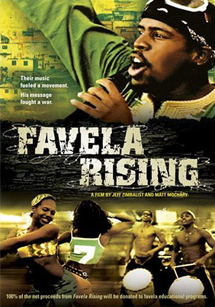|
Reviews of Recent Independent, Foreign, & Documentary Films in Theaters and DVD/Home Video

Language: Portuguese with English subtitles. Country of Origin: Brazil. 570 minutes. Not Rated. Released by: Palm Pictures. With: Darlan Cunha, Douglas Silva, Phellipe Haagensen, Jonathan Haagensen & Camila Monteiro.
FAVELA RISING
Where City of God relived the brutal drug wars in Rio de Janeiro’s 600+ favelas (hillside shantytowns) in the 1980’s, City of Men focuses on the day-to-day lives of families in these poverty-stricken neighborhoods today, as seen through the jumpy eyes of two lifelong friends who are first seen at age 13, Laranjinha (Darlan Cunha) and Acerola (Douglas Silva). Like boys their age everywhere, they are obsessed with sex, inflamed further by the heat and body-baring in Rio’s exuberant beachfront culture (satirized in season four’s “Looks Can Lie”). Losing their virginity and the meaning of fatherhood take equal screen time with their alternately funny and frightening machinations around the ever present gun-toting criminals and occasionally invading cops. The thrilling rhythms and cinematography of City of God repeat, as well as many of the actors, with staccato editing revealing the boys’ stylized dreams, nightmares, and memories. The most powerful episodes creatively integrate documentary-style images within the boys’ stories, such as season two’s “Two Tickets to Brasilia,” which ties together the personal delivery of a letter to Brazil’s president with moving testimonials of conditions in the country’s jails. A couple of episodes end with sobering statistics, such as on teen pregnancy in season three’s “Didn’t Mean To,” a theme dealt more frankly and poignantly than in teen soaps like the Canadian DeGrassi High or One Tree Hill in the U.S. The same approach, though, comes across as more didactic in “Hip Sampa Hop,” which contrives a trip to São Paolo for a tour of its hip-hop culture. In the second season, the beach becomes a fraught meeting place for boys and girls of different social classes, all bristling with stereotypes about each other. The favela boys amusingly avoid tensions, finding common mischief with “playboys,” as middle-class kids are called, and Asians on vacation from São Paolo, who are, in turn, ridiculed as “Japs.” Dark-skinned Acerola constantly faces racism outside the favela, though the dangerous appeal of favela guys to outsider gals gets a bit repetitive by season four’s “Fatal Attraction.” The dark side of adult responsibilities that enveloped the boys in the final season will be at the center of the concluding feature film as they reach adulthood. Annoying enough that the three-disc set confusingly does not distinguish between the different seasons, which have to be inferred as the two leads grow up over time, the bare bones packaging of the complete series has no extras. Sorely lacking is a music playlist, given that the diverse song selections bring the favela culture vividly to life. No “making of” segment explains how the stories were gathered from interviews with actual community residents. The closest is the charming final episode “Somewhere in the Future,” which, in an amusing pretense, the two lead actors break out of their characters and explain how they were cast as 10 year olds for Palace II, the 2000 short film prequel for both the film and TV series. For factual background on the favelas and the stark realities of how residents creatively deal with the police and drug traffickers, the documentary Favela Rising is an essential complement to the fictional saga. This story of hope amidst brutality focuses on two inspiring men, Anderson Sã, who found that AfroReggae music could save him from criminal temptation, and Jose Junior, who channeled that passion into a growing outreach organization for children and young adults. Directors Matt Mochary and Jeff Zimbalist, originally student and teacher at the New York Film Academy, effectively edit together archival and daringly filmed new footage of street life with interviews of the two men, their friends and family, as well as investigative journalists. The directors provide much more context than the somewhat similar Los Angeles-based documentary Rize. One boy interviewed is so frank about how drug dealers control his neighborhood that the translator nervously warns him to be more careful. What starts as a story of home-grown leadership triumphing over social and economic adversity suddenly becomes, towards the end, an even more stirring tale of personal courage in the face of tragic fate.
Oddly, an electronica soundtrack too often substitutes for the energetic percussion of the AfroReggae performers, though there is a bonus music video
on the DVD. The 20-minute extra “Behind the Documentary” provides enlightening interviews with the directors on the genesis and process of the project
and the film’s role in foundation-funded community outreach from Haiti to Harlem. Nora Lee Mandel
|

